
October-December 2019
Editorial: Strengthening Capacity
 Capacity strengthening is fundamentally a process by which individuals and organizations acquire new skills and knowledge; or improve the existing ones that are required to do their jobs competently. To speak simply, capacity strengthening improves performance and enhances the ability of an individual or an organization to function more professionally and continue to stay relevant within a rapidly changing environment. We know that strengthening the capacity of an individual or an organization recognizes the existing capacity of connecting the DOTS within and outside the organization.
Capacity strengthening is fundamentally a process by which individuals and organizations acquire new skills and knowledge; or improve the existing ones that are required to do their jobs competently. To speak simply, capacity strengthening improves performance and enhances the ability of an individual or an organization to function more professionally and continue to stay relevant within a rapidly changing environment. We know that strengthening the capacity of an individual or an organization recognizes the existing capacity of connecting the DOTS within and outside the organization.BCCWG became as an effective SBCC platform to bring continuity and consistency
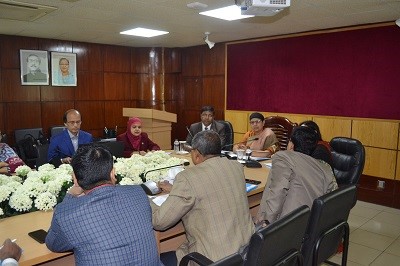 “The Behavior Change Communication Working Group (BCCWG) made a significant contribution and became as an effective GO-NGO platform by sharing, coordinating and collaborating to bring continuity and consistency in the SBCC interventions planned and implemented under HPN programs.” While making this comment Begum Reena Parveen, Additional Secretary (PHWH), HSD, MoHFW and Chairperson of the meeting also emphasized the use of ICT in further multiplication of the effect of SBCC in HPN sector.
“The Behavior Change Communication Working Group (BCCWG) made a significant contribution and became as an effective GO-NGO platform by sharing, coordinating and collaborating to bring continuity and consistency in the SBCC interventions planned and implemented under HPN programs.” While making this comment Begum Reena Parveen, Additional Secretary (PHWH), HSD, MoHFW and Chairperson of the meeting also emphasized the use of ICT in further multiplication of the effect of SBCC in HPN sector. 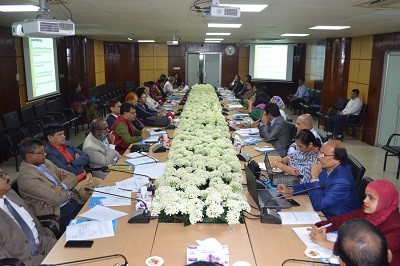 Updates and plan for HPN SBCC annual monitoring report collection, compilation and publication have been agreed on to get rolled over.
Updates and plan for HPN SBCC annual monitoring report collection, compilation and publication have been agreed on to get rolled over.Procurement contract should aim at improving quality of lives
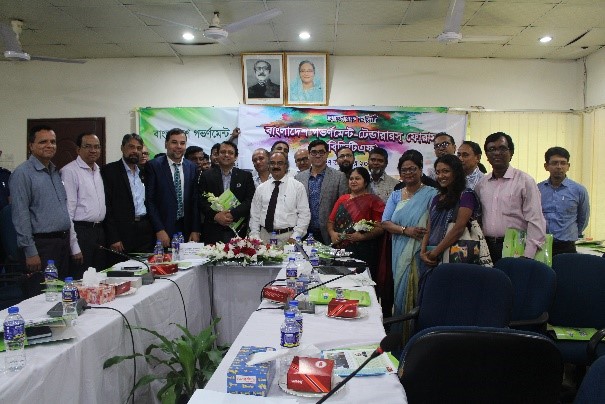 The Central Procurement Technical Unit (CPTU) of IMED, Ministry of Planning, organized a meeting on October 27, 2019 (Sunday) to form the convening committee at the auditorium of the Roads and Highways Department at Tejgaon in Dhaka.
The Central Procurement Technical Unit (CPTU) of IMED, Ministry of Planning, organized a meeting on October 27, 2019 (Sunday) to form the convening committee at the auditorium of the Roads and Highways Department at Tejgaon in Dhaka.A seamless coordination between MoHFW, HPN units, NGOs and DPs requires for SBCC program implementation and monitoring
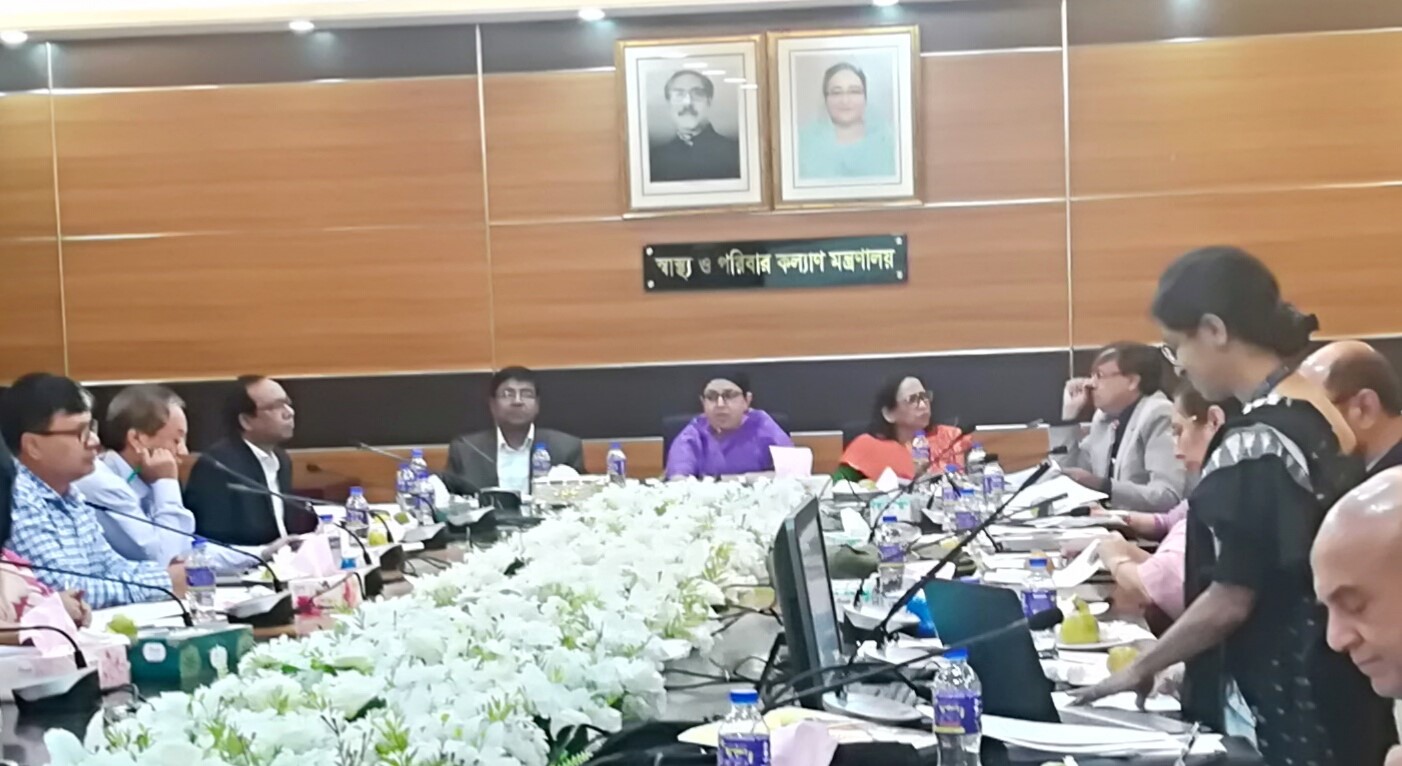 “A unified and seamless coordination between MoHFW, Health, Population, Nutrition Units, NGO and DPs becomes an important issue in achieving HPNSP goals and targets through appropriate program implementation and monitoring following the National SBCC Strategy.” While mentioning this in the 2nd meeting of the National HPN SBCC Strategy Implementation and Monitoring Committee, Begum Reena Parveen, Additional Secretary (PHWH), HSD, MoHFW and chairperson of the meeting underscored the need of this meeting.
“A unified and seamless coordination between MoHFW, Health, Population, Nutrition Units, NGO and DPs becomes an important issue in achieving HPNSP goals and targets through appropriate program implementation and monitoring following the National SBCC Strategy.” While mentioning this in the 2nd meeting of the National HPN SBCC Strategy Implementation and Monitoring Committee, Begum Reena Parveen, Additional Secretary (PHWH), HSD, MoHFW and chairperson of the meeting underscored the need of this meeting.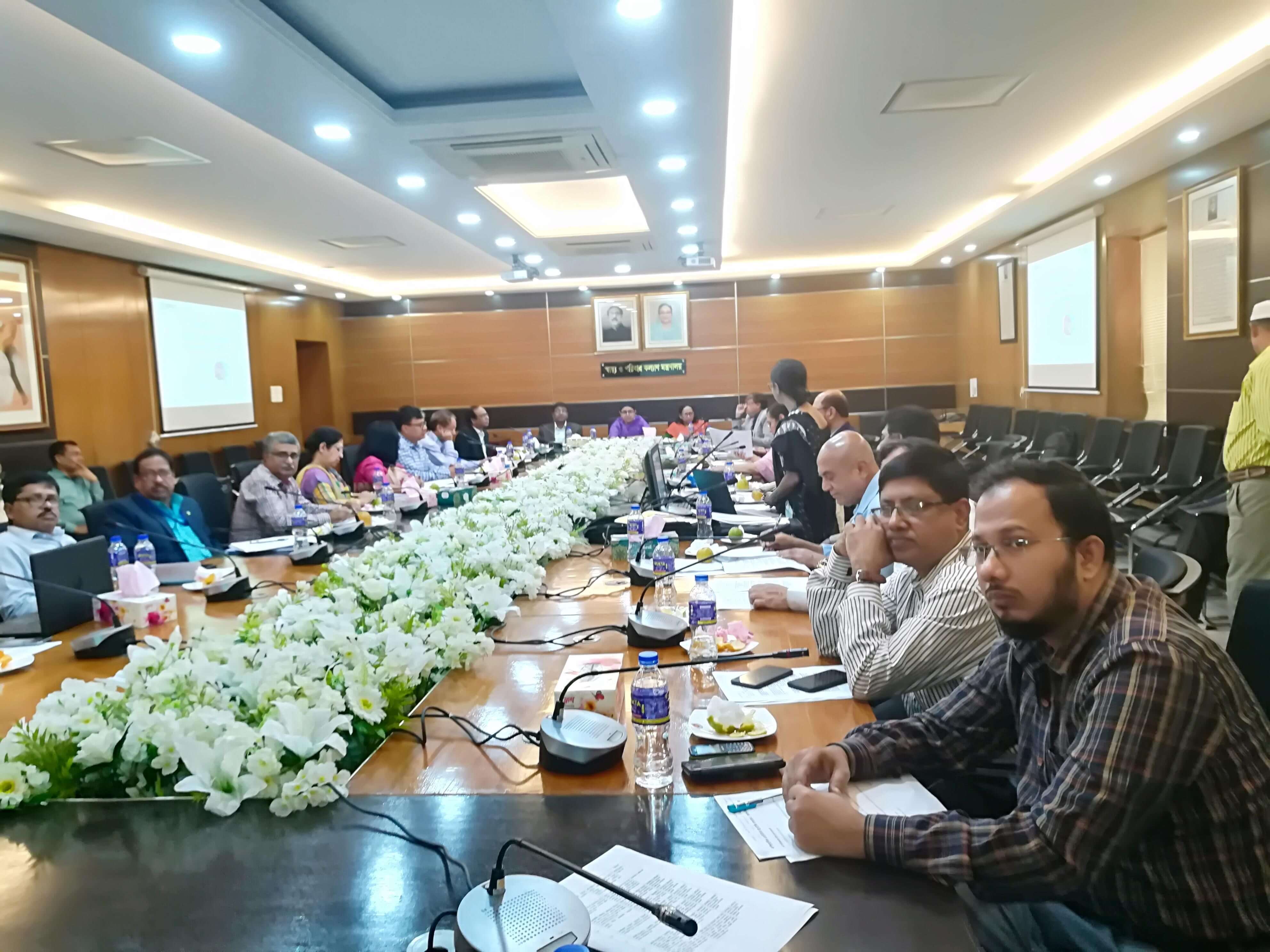 While reviewing the work progresses of last meeting it made a note of satisfaction that 80% of the progresses could have been achieved following the last meeting’s decision. In discussing over the meeting agenda, discussions mostly focused on the key findings of Ujjiban SBCC Baseline Survey. The meeting comments that the findings of survey could have been better utilized understanding the HPN knowledge and practices of the underserved areas. The study findings over the better HPN knowledges of males compare to females requires in-depth inner views about the reason of this unusual findings. People’s health behavior and practice requires repeated pursuance with consistency and univocal messaging. Future SBCC studies can introduce factors impeding people’s behavior and practice over level of learnings from repeated and consistent messages. Need to introduce NCD related behavior and practice of the people as it has now become the deadlier cause of deaths.
While reviewing the work progresses of last meeting it made a note of satisfaction that 80% of the progresses could have been achieved following the last meeting’s decision. In discussing over the meeting agenda, discussions mostly focused on the key findings of Ujjiban SBCC Baseline Survey. The meeting comments that the findings of survey could have been better utilized understanding the HPN knowledge and practices of the underserved areas. The study findings over the better HPN knowledges of males compare to females requires in-depth inner views about the reason of this unusual findings. People’s health behavior and practice requires repeated pursuance with consistency and univocal messaging. Future SBCC studies can introduce factors impeding people’s behavior and practice over level of learnings from repeated and consistent messages. Need to introduce NCD related behavior and practice of the people as it has now become the deadlier cause of deaths. - A concept notes on a national level survey for assessing the impact of SBCC attaining HPNSP indicators.
- NIPORT will consider to introduce SBCC indicators in the BDHS survey.
- A curriculum will be developed to provide a cascaded model of leadership training/workshop at the divisions, district and upazila level.
- A guideline be developed for activation of National to Upazila level SBCC committees and on attaining support of the development partners consortium in effective way.
- Initiative will be taken in establishing a cell/desk at the HSD of the MoHFW to increase SBCC leadership capacity of the PH wing.
Student & Police Engagement - Sylhet Student Leadership Development Workshops
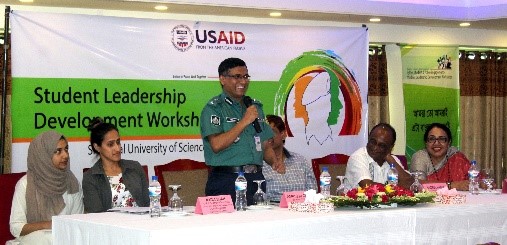 The young generation of a nation is an asset of the society. Bangladesh is no exception. Oftentimes in our country social changes are brought about by the youth. So, it is important to ensure that they do not fall into the pitfalls of violent extremism. A way to change these existing practices is to motivate the police force as well as the students of our country to learn to work together to establish a peaceful civil society. The development of this police-student relationship can give us a light of hope to stop the young generation from being involved in extremist ideologies and activities.
The young generation of a nation is an asset of the society. Bangladesh is no exception. Oftentimes in our country social changes are brought about by the youth. So, it is important to ensure that they do not fall into the pitfalls of violent extremism. A way to change these existing practices is to motivate the police force as well as the students of our country to learn to work together to establish a peaceful civil society. The development of this police-student relationship can give us a light of hope to stop the young generation from being involved in extremist ideologies and activities.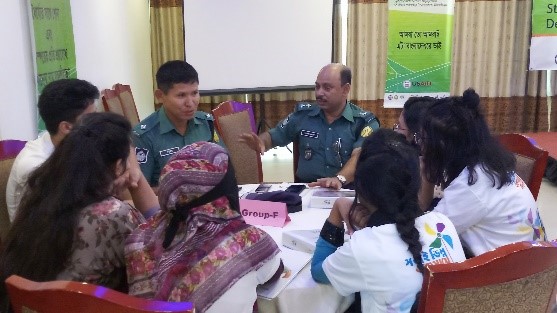 During the implementation of the above said activities police participants were present with the student participants in all the activities in the campus and in the community and also improved their relationship in the campus and community and had a strong networking among them.
During the implementation of the above said activities police participants were present with the student participants in all the activities in the campus and in the community and also improved their relationship in the campus and community and had a strong networking among them.Inception meeting held on ‘Consultancy Services for Development of Communication and KM Strategy and Outreach Plan for SREDA’
Unlocking Economic Potentials of the South West of Bangladesh through Gender Sensitive Infrastructure and Logistic Service.
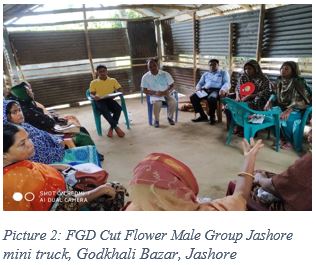
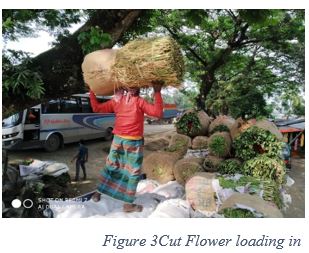
BCCP has been awarded a project: Review of In-service Training
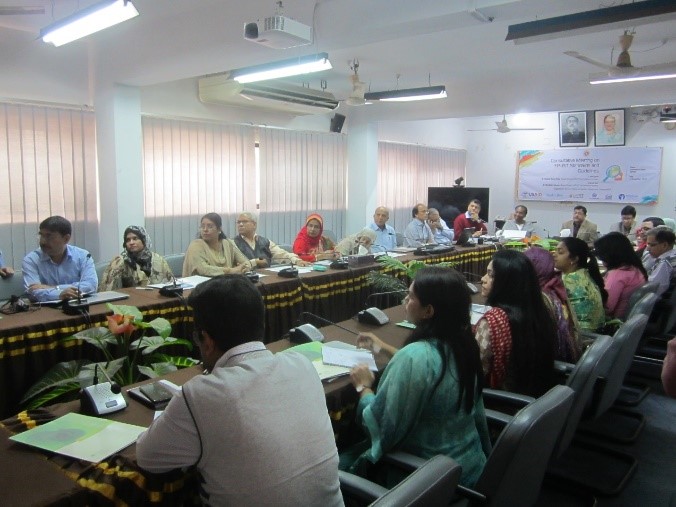 BCCP has been awarded a project titled Review of In-service Training that began from November 04, 2019. The key objective of the assignment is to develop of guidelines for FP related In-service training for each cadre, training plans and capacity building of training institutes to offer FP-IST. The project is supported by IntraHealth International, Inc., a subgrantee of Shukhi Jibon Project of USAID. In this connection, a consultative meeting on Standards and Guideline of Family Planning In-service Training (FP-IST) was held at the Conference Room of National Institute of Population, Research and Training (NIPORT) on 15, December, 2019. The objective of the meeting is to share the preliminary findings of FP-IST mapping, obtain recommendation on development of guideline for FP-IST. Mr. Susanta Kumar Saha, Director General and Additional Secretary was present as Chief Guest and Mr. Md. Matiar Rahman, Director (Training), NIPORT and Additional Secretary was present as Chair and Stumble Mugore, Senior Technical Adviser, IntraHealth International Inc. was present as special Guest. Based on the recommendations of the Consultative Meetings a draft outline of FP-IST Guideline prepared. A total of 20 participants from DGFP, DGHS, NIPORT, MFSTC, MCHTI, FWVTI, Dhaka, Shukhi Jibon, USAID Ujjiban SBCC Project were present in the meeting.
BCCP has been awarded a project titled Review of In-service Training that began from November 04, 2019. The key objective of the assignment is to develop of guidelines for FP related In-service training for each cadre, training plans and capacity building of training institutes to offer FP-IST. The project is supported by IntraHealth International, Inc., a subgrantee of Shukhi Jibon Project of USAID. In this connection, a consultative meeting on Standards and Guideline of Family Planning In-service Training (FP-IST) was held at the Conference Room of National Institute of Population, Research and Training (NIPORT) on 15, December, 2019. The objective of the meeting is to share the preliminary findings of FP-IST mapping, obtain recommendation on development of guideline for FP-IST. Mr. Susanta Kumar Saha, Director General and Additional Secretary was present as Chief Guest and Mr. Md. Matiar Rahman, Director (Training), NIPORT and Additional Secretary was present as Chair and Stumble Mugore, Senior Technical Adviser, IntraHealth International Inc. was present as special Guest. Based on the recommendations of the Consultative Meetings a draft outline of FP-IST Guideline prepared. A total of 20 participants from DGFP, DGHS, NIPORT, MFSTC, MCHTI, FWVTI, Dhaka, Shukhi Jibon, USAID Ujjiban SBCC Project were present in the meeting.